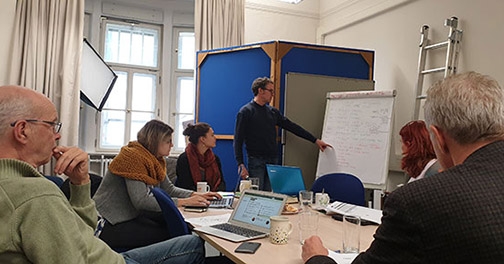The COVID-19 crisis led to more and more people questioning their career. Especially for disadvantaged people who found themselves deprived from their main source of revenue. As a matter of fact, a bigger demand for training and education arose. It has been found that people coming from a disadvantaged background or that are remote from learning have more difficulties owning their learning, they need empowerment and encouragement. This makes participatory methods an innovative way to get them to be involved in their learning and to make sure they feel at ease while learning.
The Erasmus project PARTICIPATE aims to develop a model for participatory approaches in adult learning, empowering learners to engage actively in their own learning. Through the organisation of focus group in Germany, Spain, Romania and Greece, we had the opportunity to talk with adult learners, about their expectations regarding participatory methods in adult education. The majority of the participants believed that it is better for the learner to be involved in the design of the training course. However, one prerequisite to do so would be for the learner to « have at least some basic knowledge on the subject ». When asked what they expect from their participation in the design of a training course, one participant expects to be fully involved in designing learning outcomes while others expect to be involved in secluded parts of the designing of the course (tailoring of the course; designing a course with multiple paths that can address different learning needs; gathering new knowledge from the process; contributing to the whole experience of the other participants).
The results from this focus group show that there is a demand to actively contribute in the courses and to claim them for oneself. These results also join Paulo Freire’s point of view who advocates for an education that is either an instrument to facilitate the integration of generations into the logic of the present system and bring about conformity to it, or a "practice of freedom", to allow men and women to deal critically with reality and discover how to participate in the transformation of their world. Our case falls into the first scenario. Through participative education, adults with little educational background can integrate the functioning of the present system and therefore create their own space within this system.
Through a survey carried out in 2020, we aimed at capturing examples of participatory approaches, tools or instruments that have been effective in allowing the participant to have an input into their learning pathway. The results of the survey showed that the principal characteristics of best practices to involve learners were a course or group design flexible enough to take participant feedback into account and participants being involved in identifying their own learning needs. The courses were also designed in a way to include active learning methods such as group projects, role-playing games and workshops.
Following, these results, we could propose Malcolm Knowles’ Andragogy method as a participatory practice to implement in adult education. This method is based on the learner’s readiness for learning. There is no hierarchical organisation: the trainer and learners are equal, the trainer’s role is only to facilitate interaction, exchange of experience, etc. The whole training is based on people’s experience and knowledge, it is constructed as a moment for sharing and of mutual enrichment.
To conclude, implementing such methods can have many beneficial effects on learners. Indeed, the results of the survey show that it encourages universal participation, helps learners detect their needs and expectations from participating in the program, favours positive response and stimulates motivation, etc. Participatory methods create an environment that encourages initiative and empowerment for people that are not used to a scholarly environment.
More information on PARTICIPATE project at https://www.participate-project.eu/
